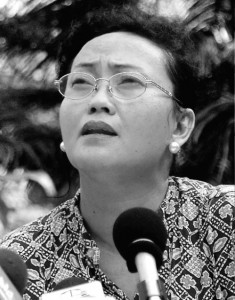“Strengthening and empowering the community is the key to change.”
Nursyahbani Katjasungkana (born 1956) is a feminist lawyer and advocate of womens human rights. In 1995, she founded the Womens Association for Justice (APIK) and established the Womens Legal Aid institution in Jakarta, the members of which were initially recruited from among former clients and survivors and trained as paralegals. During the 1998 reformation, along with several other women activists, Nursyahbani founded the Indonesian Womens Coalition for Justice and Democracy, the first mass-based womens organization in the country since 1965, and was elected its first Secretary General.
When Nursyahbani Katjasungkana began her career as a lawyer and director of Jakarta Women’s Legal Aid in 1987, the profession was a male dominated field and expressions like “womens rights”, “feminism” and “violence against women” were not part of the language. But early on, the young lawyer was aware of the poor legal status of Indonesian women and womens rights. This led her to found the Womens Association for Justice (APIK) and the Womens Legal Aid of the Indonesian Womens Association for Justice (LBH APIK) in 1995. Nursyahbani believes that through what she calls “transformative legal aid”, the law can be reformed to serve the interests of women. Running a legal aid institution for women, Nursyahbani has learned that a clients dependence on her lawyer is not beneficial to a community and that a community needs to develop its own support system. This is why LBH APIK is founded on the fundamental principle of community-based legal aid, where ex-clients and survivors are trained to be paralegals and are in turn expected to transfer their skills and knowledge to the community. Nursyahbani explains: “LBH APIK uses legal cases as an entry point to see how existing laws serve women. If it is found that the law is not responsive (to the needs of women), then we will carry out policy advocacy to change the law.” She adds, “We use these cases as a radar to monitor how the system works.” As a feminist lawyer, Nursyahbani recognizes the vital role of the community in the process of legal transformation. She envisions an “alternative legal system that is bottom-up” through community empowerment. In her vision, “legal reform from the perspective of the people” underlies the transformative legal change that will help achieve womens equality.
Koalisi Perempuan Indonesia Womens Association for Justice (APIK) Womens Legal Aid of the Indonesian Womens Association for Justice (LBH APIK)
Southeastern Asia | Indonesia

